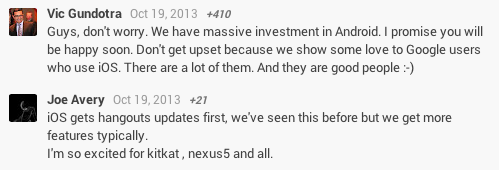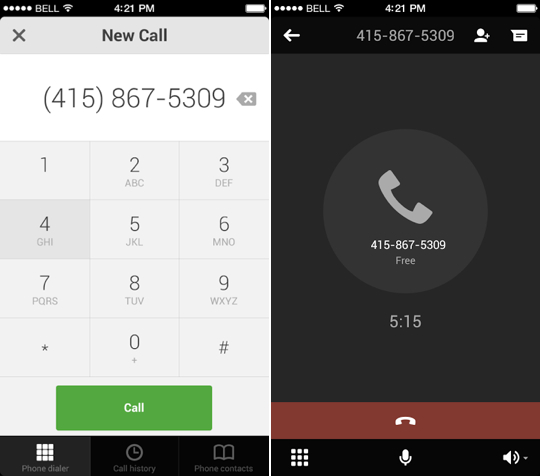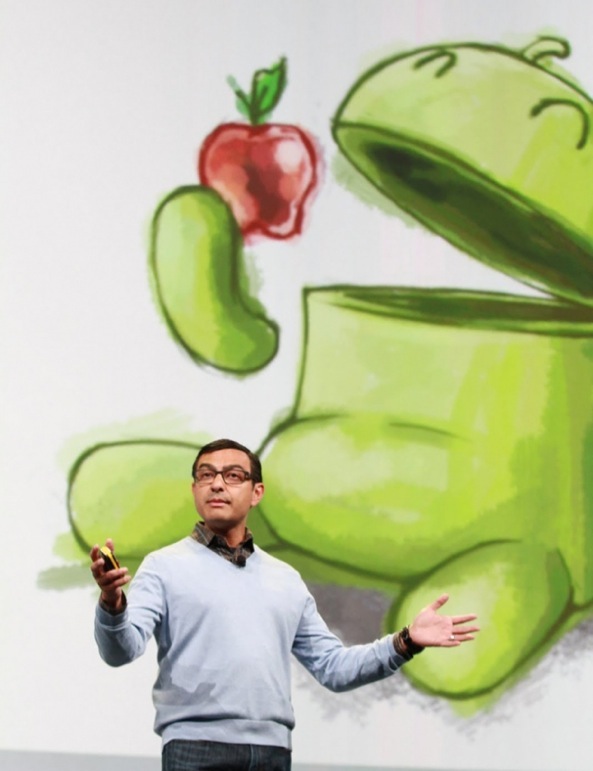Apple doesn’t port its own iPhone and iPad apps to Android, but let’s pretend for a moment it did. How would you feel if the company issued a major update to, say, its Apple Store shopping app for Android first, then days or weeks later gave the iOS edition some much-needed love?
Wouldn’t you have felt left behind?
You now have a good picture of the outrage flaming in the Android community after Google gave the iPhone users the ability to send and receive Google Voice calls through the Hangouts iOS app (free download).
Remarkably, this game-changing feature has yet to hit the Android Hangouts edition.
It’s actually so bad that Vic Gundotra, Google’s Senior Vice President of Engineering, had to jump into the comments section of his announcement blog post and reassure Android fans that Google hasn’t forgotten about them. There will be an update coming soon, he promised and pledged users to make love, not war…
The Hangouts iOS update arrive this past Saturday with free Google Voice calling within the United States and Canada and low-rate international calling starting at two cents per minute, over Wi-Fi or cellular.
The substantial update basically turns iPod touch devices with a dedicated Google Voice number into a VoIP cell phone of sorts. By the way, Gundotra teased that “We have plans for Google Voice that I think are exciting,” but stopped short of giving the specifics.
Gundotra’s announcement Google+ post also highlights support for in-line animated GIFs in Hangouts for iOS and how the app gently ducks your music on incoming messages and cranks the volume back up instead of “interrupting your groove”.
None of the aforementioned features has made it to Android yet nor has Google provided any timetable. Making matters worse, Google pulled a similar maneuver with its recent major Maps and Search native apps which, too, hit iOS first.
Needless to say, this didn’t sit well with Android die-hards, especially long time Android fans who were getting a bit fed up.

Gundotra tried to appease to Android fans in the comments, his full response reading as follows:
Guys, don’t worry. We have massive investment in Android. I promise you will be happy soon. Don’t get upset because we show some love to Google users who use iOS. There are a lot of them. And they are good people
Say, those are nice words for iOS users, Vic!
One poster responded this:
No one is saying that they are not good people. But they are not as loyal as us who have been android since the begining. No one is saying to leave them out of the loop… But make them second. Reward the loyal fans first.
The other person wrote:
Android is obviously my focus, but iOS must get the attention it deserves. It’s still insanely popular.
I chuckled after reading this:
Just got a GIF from an iOS user… Super embarrassed right now.
One guy sarcastically reminded Gundotra of Google’s poor treatment of Microsoft’s native YouTube app for Windows Phone, which the company ordered be taken down due because it didn’t show ads.
“But we don’t love the Google users on Windows Mobile, because they’re not good people, right?”, a joker asked rhetorically.
The most likely reason for Google’s ‘iOS first’ move with Hangouts: Android 4.4 code-namedKit Kat.
It’s fairly safe to assume the company is planning to add iOS features to Hangouts for Android as part of the Kit Kat release.
And herein lies the problem: it probably wouldn’t feel so bad if loyal Android fans didn’t feel like they were getting toyed with waiting for Android 4.4. On a more positive note, it should be well worth the wait.
After it arrives, Hangouts should be integrated way better into Android than it ever will on iOS as Apple doesn’t allow for features like SMS integration or app defaults.

Screenshots via our friends over at Android Authority.
Google has long benefited from the OS-level integration of its services until after the summer of last year, when iOS 6 came along and dropped the stock Google Maps and YouTube maps. The search giant on its part moved swiftly and acted responsibly by doubling-down and adding a bunch of compelling new features to its most popular iOS apps such as Gmail, Hangouts, YouTube, Maps and more.
On the other hand, the company has also managed to break hearts of long time Apple fans who had to cope with the realization that the popular iOS email client Sparrow has gained zero new features since being acquired by Google in the summer of 2012.

Apple fans were not amused after Gundotra put up this slide at Google I/O 2011.
Some Google acquisitions benefit everyone, like Quickoffice and Snapseed - both apps have gone free post-acquisition. Google’s other iOS apps such as Google Voice have gone without a meaningful update for ages. Priorities.
If I wanted to by cynical, I’d say Google is simply doing what other developers have been doing – develop for iOS first, Eric Schmidt be damned.
This isn’t so outrageous given iOS is making Google a couple times more revenue than Android.
Summing up, both iOS and Android offer great features and have some of the most ardent fans out there, the types who live and die by their platform of choice. Outside the geeky world, however, mainstream consumers couldn’t care less about platform wars.
Some people prefer iOS while others profess their love for Android. There’s nothing wrong about that whatsoever. Having said that, I think it’s a little silly that we’re even having this debate about which platform any one developer should be targeting first.
This dilemma is irrelevant as long as people get feature-parity across platforms and decent capabilities get rolled out concurrently, in a timely manner and not at the expense of the ‘other’ platform.
Believe it or not, that’s how I think the landscape should look like in an ideal world.
No comments:
Post a Comment